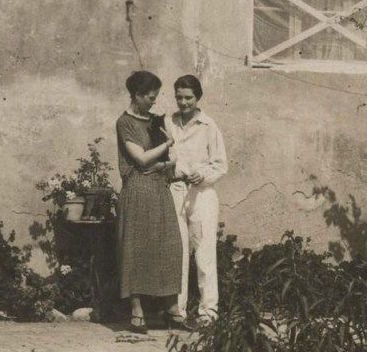… the Duchess was an “experience”—a poorly lit hole with pounding music and thick clouds of smoke. “Our clothes will reek,” Ada said.
From a rickety table in the corner, they watched women half their age dancing and flirting, dressed in everything from tight T-shirts to oversized flannel that resembled Ada’s daddy’s pajamas. The booming beat of a younger generation turned any conversation into a shouting match. The lyrics—the ones Ada could understand—were baffling. “‘Come on, baby, make it hurt so good’? What kind of song is that?” She still preferred the music of her youth—Johnny Mathis, Patsy Cline. Cam just smiled.
In 1982, as middle-aged women, the main characters in my novel, The Ada Decades, make a once-in-a-lifetime journey to New York City for the Gay Pride March. Ada, the protagonist, has never been more than a three-hour drive from Charlotte, N.C., and the two are not “out” in their hometown. Her partner, Cam, plans the trip because, as she says, “I’m fifty years old, and I have never been to a real-life gay event.” After some sightseeing at Macy’s and the New York Public Library, the women head for Greenwich Village and a big dose of queer culture.
It was great fun for me to write this chapter, which is called “The Language of New York.” I lived in NYC for twenty years, and still have a fondness for it. Many of the queer sites Ada and Cam visit in the chapter—like the sleazy, long-defunct women’s bar, the Duchess (101 Seventh Avenue South)—were places I frequented as a young lesbian. The Duchess was the first lesbian bar I ever went to, and my friends and I would often hang out there after volunteering at the feminist newspaper, WomaNews.
Because Ada and Cam are a librarian and a school teacher, respectively, they also hit the lesbian and gay bookstores.
They made a stop at Oscar Wilde Memorial Bookshop—“Twig won’t believe this!” Ada said, snapping a picture with her Kodak—then found their way to Djuna Books, a lesbian-owned shop where they spent a good hour perusing books even Ada had never heard of. Cam bought a baseball cap emblazoned with the word DYKE and put it on immediately. “When in Rome,” she said. Ada picked out a button that read: We Are Everywhere, but she was afraid it would leave holes in her blouse, so she attached it to her canvas purse instead.

Djuna Barnes and her lover, Thelma Wood
Even though I bought many a book there back in the day, I only vaguely remember the interior of Djuna Books, a cozy store close to where the author Djuna Barnes (1892-1982) lived at 5 Patchin Place. Barnes—a journalist, illustrator, and author of the classic Modernist novel Nightwood—did not identify as lesbian even though her primary relationships were all with women. She reportedly called her namesake “a terrible little lesbian bookshop,” even phoning to demand the owners change the name.
To read about Ada and Cam’s Manhattan trip and about their other adventures through life, you can now pick up a copy of The Ada Decades at your favorite bookstore or online retailer.
Read Full Post »








You must be logged in to post a comment.